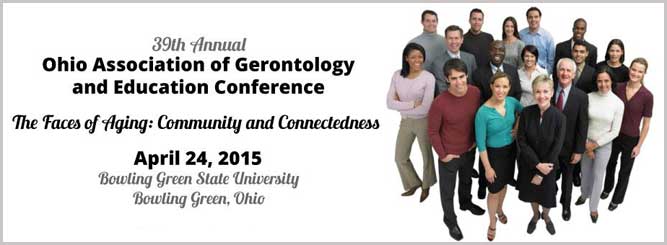Posters
Location
BTSU Ballroom
Start Date
24-4-2015 10:30 AM
End Date
24-4-2015 11:15 AM
Description
As the amount of New Communication Technologies (NCTs) being created increases at an exponential rate it is important to better understand how all portions of our population take advantage of newer NCTs, including older adults. This study sought to better understand older adult’s attitudes towards NCTs as a means of learning and adaption as well as maintaining independence. The researchers argued that older adult’s attitudes toward NCTs have an effect on older adult’s perceived and therefore actual usability. This study was conducted by a communication research methods course at an Ohio public university and it included surveys and interviews of 525 older adults living in the Midwestern United States. The researchers divided the participants into four age groups, Builders, Boomers, Generation Xers and Millennials, and focused primarily on web literacy, performance expectancy, and effort expectancy. The researchers found that there were significant generational differences in attitudes towards NCTs and younger generations were more likely to positively respond to newer NCTs than older generations. The researchers also found that older adults do not experience an immediate attraction to NCT’s unlike younger generations. The researchers posit that these results indicate that must be a greater focus on reducing the deficit between younger and older generations and their respective levels of NCT literacy.
Included in
Older Adults Attitudes Towards New Communication Technologies
BTSU Ballroom
As the amount of New Communication Technologies (NCTs) being created increases at an exponential rate it is important to better understand how all portions of our population take advantage of newer NCTs, including older adults. This study sought to better understand older adult’s attitudes towards NCTs as a means of learning and adaption as well as maintaining independence. The researchers argued that older adult’s attitudes toward NCTs have an effect on older adult’s perceived and therefore actual usability. This study was conducted by a communication research methods course at an Ohio public university and it included surveys and interviews of 525 older adults living in the Midwestern United States. The researchers divided the participants into four age groups, Builders, Boomers, Generation Xers and Millennials, and focused primarily on web literacy, performance expectancy, and effort expectancy. The researchers found that there were significant generational differences in attitudes towards NCTs and younger generations were more likely to positively respond to newer NCTs than older generations. The researchers also found that older adults do not experience an immediate attraction to NCT’s unlike younger generations. The researchers posit that these results indicate that must be a greater focus on reducing the deficit between younger and older generations and their respective levels of NCT literacy.


